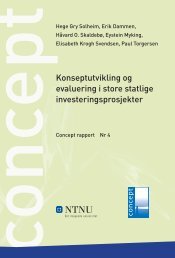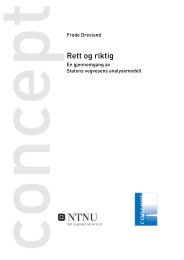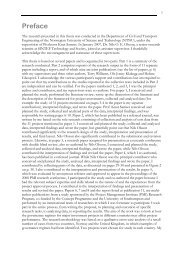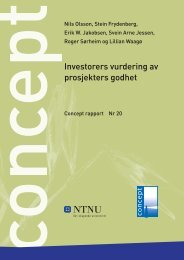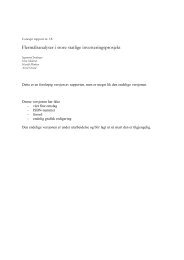International Journal of Project Management 24 (2006) 66–74INTERNATIONAL JOURNAL OFPROJECTMANAGEMENTwww.elsevier.com/locate/ijpromanManagement of flexibility in projectsNils O.E. Olsson *The Norwegian University of Science and Technology, Norway Department of Civil and Transport Engineering, Høgskoleringen 7A,N-7491 Trondheim, NorwayReceived 2 November 2004; received in revised form 1 March 2005; accepted 28 June 2005AbstractProject managers are challenged <strong>to</strong> keep their projects focused and at the same time support their organisationÕs need <strong>to</strong> adapt <strong>to</strong>changes and uncertainty in the business environment. The purpose of this paper is <strong>to</strong> analyse the dynamics related <strong>to</strong> project flexibility,both from a theoretical and an empirical perspective. To ensure the efficiency of the project organisations, flexibility is usuallynot desired in the late phases of projects. The projects in this study often applied flexibility even during these phases, usually basedon initiatives from project owners or users. It is paradoxical that while flexibility was frequently needed in the studied projects, it wasrarely prepared for. As a consequence, structured approaches <strong>to</strong> project flexibility management are called for. The study indicatesthat the opinion on project flexibility held by the involved stakeholders can <strong>to</strong> a large extent be explained by their incentives related<strong>to</strong> the projects. The empirical results in this paper are based on a multi-case study covering 18 projects.Ó 2005 Elsevier Ltd and IPMA. All rights reserved.Keywords: Managing projects; Implementing strategy; Flexibility; Adjustments1. Introduction* Tel.: +47 73 59 46 01; fax +47 73 59 70 21.E-mail address: nils.olsson@ntnu.no.In a changing world, there is a desire of project ownersand users <strong>to</strong> have ‘‘room <strong>to</strong> manoeuvre’’; <strong>to</strong> be able<strong>to</strong> adjust projects as they gain knowledge about theirneeds and changes in the project context, as discussedby Midler [1]. A number of scholars, including Kreiner[2], argue that flexibility is necessary <strong>to</strong> face the changesand uncertainty in the business environment. On theother hand, a wide range of studies (including [3–5])indicates that a clear project definition is a critical successfac<strong>to</strong>r for projects.This paper analyses flexibility in large investmentsprojects. To begin with, project flexibility is discussedfrom a theoretical standpoint. In order <strong>to</strong> illustrate differentaspects of flexibility, 18 Norwegian projects havebeen analysed. The projects include a wide range of differentindustries, project sizes and types. Most of theprojects are publicly financed.2. Perspectives on project flexibilityFlexibility management is not a new concept. Sager[6] found several examples of flexibility as one approach<strong>to</strong> prepare for the effects of uncertainty in planning.However, Sager also notes that flexibility is an importantterm often used by planners but rarely scrutinisedtheoretically. Kreiner [2] points out that the traditionalfocus on stability in project management becomes challengedunder uncertainty. This creates ‘‘drifting environments’’.KreinerÕs drifting environments are notnecessarily caused by actual changes in the project context.They may also occur when project stakeholders geta better understanding of their actual needs and improvedability <strong>to</strong> express the needs. Flexibility can alsobe seen as a response <strong>to</strong> environmental uncertainty, as0263-7863/$30.00 Ó 2005 Elsevier Ltd and IPMA. All rights reserved.doi:10.1016/j.ijproman.2005.06.010
N.O.E. Olsson / International Journal of Project Management 24 (2006) 66–74 67discussed by Karlsen [7]. Real options are an establishedperspective on project flexibility with roots in financialoptions theory; see for example Brennan and Trigeorgis[8]. In this perspective, the value of flexibility can bequantified in monetary terms. Amram and Kulatilaka[9] compare flexibility <strong>to</strong> owning an option – the right,but not the obligation <strong>to</strong> take an action in the future.According <strong>to</strong> the real-options paradigm, uncertaintycan increase the value of a project, as long as flexibilityis preserved and resources are not irreversiblycommitted.Mandelbaum and Buzacott [10] uses the number ofthe remaining alternatives after a decision has been takenas a measure of flexibility. In a similar manner asMidler [2], Eikeland [11] discusses project flexibility related<strong>to</strong> ‘‘room for manoeuvring’’. The ‘‘room formanoeuvring’’ is made up by future yet undeterminedinternal decisions, and may also be seen as a measuremen<strong>to</strong>f internal uncertainty of the project. According<strong>to</strong> Eikeland [11], a decision is within the room formanoeuvring if it does not violate the consequences ofprevious decisions. Terms like adaptability and robustnessare often used when discussing issues related <strong>to</strong>what this paper calls flexibility. Flexibility may also bedescribed as a way of making irreversible decision morereversible or postponing irreversible decisions until moreinformation is available. Husby et al. [12] defines projectflexibility as ‘‘the capability <strong>to</strong> adjust the project <strong>to</strong> prospectiveconsequences of uncertain circumstances withinthe context of the project’’. The use of the term flexibilityin this paper is based on this definition.2.1. Flexibility in the process and the productThe capability of projects <strong>to</strong> adjust can be related <strong>to</strong>how the projects are executed and <strong>to</strong> how adaptable thefinal product will be, once it has been produced. Flexibilityin the decision process is based on an approachwhere decisions and commitments in the projects aremade sequentially over episodes.Three strategies <strong>to</strong> achieve flexibility in the decisionprocess may be identified. Firstly, a ‘‘late locking’’ ofproject concepts, specifications and organisation canbe used, as discussed by Miller and Lessard [5]. Millerand Lessard refer <strong>to</strong> late locking as an exploring, iterativefront-end process. They claim that late locking isas key success criteria for large engineering projects.Once the projects are locked, they are executed in a traditionalway. The second strategy is related <strong>to</strong> a continuousstep-by-step locking of the project by a successivecommitment <strong>to</strong> projects. This may be achieved by theuse of decision gates models, as shown by Eskerodand Östergren [13] or by incremental decision making,as advocated by Genus [14]. The third strategy is foundin contingency planning, where a set of base plans is defined,but also a set of alternative plans that can be activatedif needed. According <strong>to</strong> Chapman and Ward [15],contingency plans reflect anticipated potential departuresfrom the defined plans for a project. Contingencyplans are alternative plans that can be used if the baselineplans cannot be executed. Chapman and Wardpoint out that it is important <strong>to</strong> restrict the developmen<strong>to</strong>f detailed contingency plans in order <strong>to</strong> reduce planningcost.Flexibility in the product is achieved when the finalproduct of the project is prepared for alternative use.As described by Brand [16] and Blakkstad [17], this approach<strong>to</strong> flexibility is used in building construction.According <strong>to</strong> Arge and Landstad [18], a commonly usedclassification of building adaptability was made in Swedenduring the 1960s and 1970s. Based on this classification,generality is the ability of the building <strong>to</strong> meetshifting demands without physical changes. In this terminology,flexibility is the possibility for constructionand technical changes with minimum cost and disturbance.Finally, elasticity means the potential for increasingor reducing the size of the building. In this paper, allthese three characteristics are summarised as flexibilityin the product.2.2. Interaction between flexibility in the decision processand the productFlexibility in the decision process and the productmay interact for any given project. The real options approachtreats flexibility in the decision process and theproduct relatively similar. However, from a projectmanagement point of view, it makes a major differenceif the flexibility lies in the product or the decision process.Different strategies for project flexibility managementare identified in Fig. 1, each characterised byhigh or low flexibility in the process and product,respectively.As indicated in Fig. 1, the situation with low flexibilityin both the product and the decision process assumes stableenvironments. This does not necessarily mean thatthe environments are actually stable. It only means thatthe project concept and the management of the projectFlexibility in the productHighLowRobustconceptStableenvironmentFlowLate orcontinouslocking,ContingencyplanningLow HighFlexibility in the processFig. 1. Flexibility in the product and the decision process.
- Page 1 and 2:
ISBN 82-471-8121-5 (printed ver.)IS
- Page 3:
Preface and AcknowledgementsThe wor
- Page 7 and 8:
Table of ContentsPreface and Acknow
- Page 9 and 10:
Paper OverviewThe following papers
- Page 11 and 12:
AbstractTraditionally, projects ten
- Page 13 and 14:
alternative use. There are indicati
- Page 15 and 16:
1. Introduction1. IntroductionThis
- Page 17 and 18:
1. IntroductionFlexible projects ar
- Page 19 and 20: 1. IntroductionA literature review
- Page 21 and 22: 2. Study design2. Study designThe r
- Page 23 and 24: 2. Study designInformation Content
- Page 25 and 26: 3. Flexibility in different project
- Page 27 and 28: 3. Flexibility in different project
- Page 29 and 30: 3. Flexibility in different project
- Page 31 and 32: 4. Project stakeholders4. Project s
- Page 33 and 34: 4. Project stakeholdersmandatory qu
- Page 35 and 36: 4. Project stakeholdersBased on res
- Page 37 and 38: 5. Effectiveness and efficiency5. E
- Page 39 and 40: 5. Effectiveness and efficiencyconf
- Page 41 and 42: 5. Effectiveness and efficiencyDegr
- Page 43 and 44: 6. Project flexibility categorisati
- Page 45 and 46: 6. Project flexibility categorisati
- Page 47 and 48: 6. Project flexibility categorisati
- Page 49 and 50: 7. Conclusions7. ConclusionsThis th
- Page 51 and 52: 7. ConclusionsProject phasesFlexibi
- Page 53 and 54: 7. ConclusionsEnablersThis thesis r
- Page 55 and 56: 7. Conclusions16, Figure 17, and Fi
- Page 57 and 58: 7. Conclusions4. AbsorptionAbsorpti
- Page 59 and 60: 7. ConclusionsThere appears to be a
- Page 61 and 62: ReferencesAbbot, A. & Banerji, K. 2
- Page 63 and 64: Gareis, R. 2004. Maturity of the Pr
- Page 65 and 66: Miller, R. & Lessard, D. 2000. The
- Page 67 and 68: Part 2.
- Page 69: Paper 1.Olsson, N.O.E. 2006. Manage
- Page 73 and 74: N.O.E. Olsson / International Journ
- Page 75 and 76: N.O.E. Olsson / International Journ
- Page 77 and 78: N.O.E. Olsson / International Journ
- Page 79 and 80: Paper 2.Magnussen, O.M. & Olsson, N
- Page 81 and 82: 282 O.M. Magnussen, N.O.E. Olsson /
- Page 83 and 84: 284 O.M. Magnussen, N.O.E. Olsson /
- Page 85 and 86: 286 O.M. Magnussen, N.O.E. Olsson /
- Page 87 and 88: 288 O.M. Magnussen, N.O.E. Olsson /
- Page 89 and 90: Projects trapped in their freedom:
- Page 91 and 92: 1. IntroductionThe purpose of this
- Page 93 and 94: project phases: preparation, freezi
- Page 95 and 96: establish realistic cost and time f
- Page 97 and 98: 4. ResultsIn the following, the emp
- Page 99 and 100: lowered the quality but the volume
- Page 101 and 102: Percent ofproject onSize of remaini
- Page 103 and 104: flexibility is introduced by the us
- Page 105 and 106: 100 %First official estimateApprova
- Page 107 and 108: ReferencesAndersen, B., Fagerhaug,
- Page 109 and 110: Paper 4.Olsson, N.O.E. 2004. ‘Fle
- Page 111 and 112: The concept of project flexibilityF
- Page 113 and 114: 3. CONCLUSIONSWhat seems to be impl
- Page 115 and 116: Paper 5.Olsson, N.O.E. 2006. ‘Imp
- Page 117 and 118: 558 N. O. E. Olsson et al.ex-post s
- Page 119 and 120: 560 N. O. E. Olsson et al.Table 1.O
- Page 121 and 122:
562 N. O. E. Olsson et al.and actua
- Page 123 and 124:
564 N. O. E. Olsson et al.Table 3.
- Page 125 and 126:
566 N. O. E. Olsson et al.Table 7.S
- Page 127 and 128:
568 N. O. E. Olsson et al.with a wi
- Page 129 and 130:
Paper 6.Henriksen, B., Olsson, N. &
- Page 131 and 132:
In this paper we use the process an
- Page 133 and 134:
PROCESS ANALYSIS IN THE PLANNING OF
- Page 135 and 136:
final framework for expected patien
- Page 137 and 138:
User involvement also generated exp
- Page 139:
Paper 7.Olsson, N.O.E. & Samset, K.
- Page 155 and 156:
Project flexibility and front-end m
- Page 157 and 158:
uncertainty. External flexibility c
- Page 159 and 160:
5.2. Flexibility in decision proces
- Page 161 and 162:
Degree of redundancySlackPrecisionC



